“From Abbotsford to Afghanistan, Canadians are celebrating” – this is how the CTV News opened on the evening of Sunday, February 28th, 2010. Abbotsford is a small town just east of Vancouver in the Fraser Valley – once known for agriculture, it is better now known for its organised crime as home of the Bacon brothers. As for Afghanistan, this wartorn country is still a theater of operations for Canada’s NATO military mission.
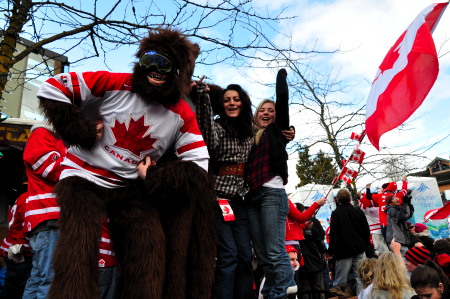
Gorilla celebrations in Whistler while Canadian forces battle guerillas in Kandahar. photo: tobias c. van Veen
In an interview with CTV’s Brian Williams the day before, Prime Minister Stephen Harper emphasized the patriotism that Canadians are (apparently) expressing, returning to this theme repeatedly. Indeed, according to Harper, Canadians have always been patriotic; they just haven’t usually expressed it like this. Canada’s CTV media has perpetuated the patriotism soundbyte; it has now become a meme echoed from broadcasters to small children. As the nation watches crazed fans painted red-and-white screaming themselves blue, we are told we are witnessing a historical act of mass patriotism. Or put it this way, as Lloyd Robertson did on CTV on Sunday evening: “The real star of the show – the people.” [[And wherever be the people, as the unification of the many under the rule of the sovereign one, be Hobbes, and the denigration of the chaotic multitude of the carnival.]] And where are these people celebrating their newly found patriotism, finally released from the repressed vault of Canadian modesty? Why — “From Calgary to Kandahar,” of course. And this is true: Canadian troops stationed at the massive Kandahar base got into the action with a ball-hockey game against the Americans (which they won 16-2).
When one sacrifices self for country, this distracted life for the nation-state, all that returns – draped in the flag – is called a patriot. Soldiers are, of course, patriots by trade. The perpetuation of the signifier of patriotism in association with what are mass acts of carnivale – dressed up in a wildly successful clothing campaign from HBC – comes about at a time when Canada as a nation-state has come to aggressively assert itself on the world stage. Canada’s current government has turned its back on tackling climate change at Copenhagen, continued the relentless development of the Alberta tar sands, renewed its commitment to military action in Afghanistan, and claimed territorial control over the northern Arctic (including its oil reserves and the NorthWest passage) against the likes of Russia. Canada’s go at the “great game” of imperialism has intersected with Canada’s “greatest games ever.” And so while at the Olympic opening ceremonies VANOC head John Furlong called for the cessation of all warfare, emphasizing the traditional Olympic truce, on that very same day in Afghanistan Canadian forces launched a combined NATO offensive. War games are interconnected with athletic games through the signifier of patriotism. Indeed:
At the exact moment their countrymen were watching the opening ceremonies at the Vancouver Winter Olympics, Canadian aviators were among the nearly 20,000 NATO and Afghan troops launching NATO’s biggest offensive yet against the Taliban and al-Qaida. […] Saturday’s operation and the deployment to Afghanistan of Canadian helicopters early last year have formed a badly needed tonic for the air force, which was starved of new equipment for decades by a succession of governments. (Mathew Fisher, “Canadians part of major NATO Afghan offensive,” 13th February 2010, Canada.com)
The new Conservative government of Canada has, of course, supplied the necessary weapons of war to the hungry forces.

Did the Conservatives steal a page from Sheila Copps by including flag sales in their economic stimulus plan? photo: tobias c. van Veen
Whether the Greek Olympicon was a defuser of war or not, Greece itself was a heavily militarized city-state where each (mostly male) citizen and slave was called upon to fight. The heritage of the Olympic Games itself lies in the nostalgic resurrection of 19th century German philology and sport, which praised all things Greek. Athleticism and patriotism go hand-in-hand in the classical works of philosophy. Socrates fights on the battlefield for Athens. Despite his service, he is charged with “corrupting the youth,” and ordered to nix himself by drinking the poisoned hemlock. Famously, Socrates does so without protest – for the prospect of death does not absolve one from following the path of goodness and truth; the life which is unexamined is not worth living.
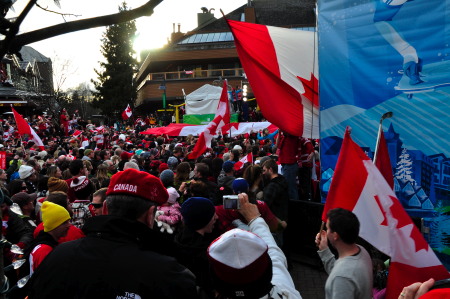
A sea of red & white engulfs Whistler shortly after Crosby's game-ending vindication of national pride, with Blue Rodeo on the stage, of course. photo: tobias c. van Veen
With the overcoming of the sanitized streets by the screaming red and white denizenry – that is, the dominant symbol of the Olympics – a persuasive discourse has arisen that seeks to reintroduce, by way of the mediasphere, the signifier of patriotism into the banality of the everyday. Just as Canadians responded in overwhelming droves to the opportunity to brand themselves with symbols of the nation-state – holding up red mitts, palms adorned with the maple leaf, draped in the flag, painted and tattooed red and white, nearly naked save for a CANADA or BELIEVE scarf, pierced with Olympic 2010 pins, and capped with a lumberjack cap or checkered CANADA toque – and thereby asserting Canadian identity through mass acts of consumerism, the mediasphere has performed its own rebranding of “patriotism” by embracing it en masse as the correct descriptor of what is otherwise going on in Vancouver, Whistler, and apparently coast-to-coast.
But is this 24/7 euphoria patriotism? Even as the critical alternative media kept emphasizing the many problems of homelessness, poverty and debt associated with the Olympics, the general will (and the mainstream media) became swept up in the epic festival, turning to participate in, wonder at and report on the seemingly spontaneous rebirth of Canadian crowds singing the national anthem. As the protesters drifted away, and the street marches concluded, flash mobs and other acts of collective jouissance broke out as the general mass took over, expressing a mad desire to quit work and party without reserve. Greater than any organised leftist attempt to reclaim the streets, the city was overtaken by its citizens who came to realise that they could go out and claim it. All one had to do was dress up in the red & white — and the keys to the city would be all but yours. On any other night, you’d be arrested, called out, impounded. But right now, in this special exception to English-Canadian cultural moralism, you could go apeshit on the streets and not only will they let you do so, they’ll brand you a patriot.
What precisely is going on here, then? Is it not carnival, in the Bakhtinian sense of a return of the repressed, where the social hierarchy is reversed, the fool made the king, and the king the fool? From Vancouver to Whistler, despite the massive security presence, surveillance cameras on every corner, blimps with thermal imaging cameras, military in the Callaghan and security checks to get within a few kilometres of Olympic venues, despite all of this, the mad party was in full effect. Cops were on the sidelines, the streets shut down, the city stalled, cars nowhere to be seen, but crazed fans everywhere, draped in an overwhelming sea of read and white. It appears that the constricted and uptight social fabric of Vancouver had given way under its own sheer weight. The stupid boredom of Vancouver had imploded.
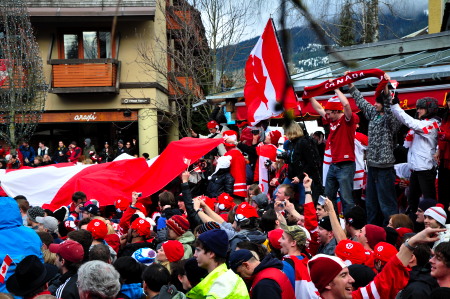
Apparently the British wore red uniforms to disguise the blood of the battlefield. photo: tobias c. van Veen

I would like to suggest that the 2010 Olympiad had become the only avenue available for crazed acts of carnival in Canada. The Vancouver Police Department, of course, sought to intervene themselves in the power dynamic (and justify their presence) by moving to close liquor stores in downtown Vancouver at 7pm, thus ensuring that the ancient upset of the social order that is carnival, and its necessary function as a release valve amongst the citizenry (and slavery), would only be all the more devastating in its catharsis. Catharsis does not merely return the social order to its balance once the hangover is over, and order restored; its energy is always one of excess, and excess exceeds the composition of the social order. Depending to the degree which the carnival manages to upend and invert the structures of the social whole, this excess either arrives as an increase in the ability of the multitude to upend the order of things again, or as a deficit to the multitude, and an strengthening of the power of the nation-state to further control the degree to which carnival reroutes and reverses the mechanics of power.
Even with the degree of carnival witnessed here, its effect is uncertain. That the mediasphere and Prime Minister are attempting to contain the excesses of carnival within the signifier of patriotism reveals a struggle over the branding of what has taken place. For the flag can be divested of its meaning as a patriotic symbol of the nation state, and become but a cloak. Why wrap yourself in anarchist black when the flag is a much better disguise? And why should the flag only be the providence of the military and its militias? Much like 1960s America, the symbols of the nation state can be repurposed to different meanings. The Canadian flag can no longer mean somber (and sober) patriotism. No, it also means wild, uncontrolled, red and white madness, carnivale of the Canadian culture, celebration without purpose as an expression of patriotism. The flag is a contradictory symbol, split through and through. And how does this contradiction, this split of differentiation, take place? Well, by exiting the work machine to reclaim the streets, thereby demonstrating that “patriotism” undermines the state’s ability to control its populace.
In this respect, the Vancouver 2010 Olympics have more in common with Montréal’s EXPO ’67 than Vancouver’s EXPO ’86. The baby boomers had their big coming out party at EXPO ’67, as did the Quiet Revolution in Québec, which gave birth to a new Montréal, one in which the city would become a cultural hub, and where festivals would come to define the city’s landscape and economy. The carnivale that was EXPO ’67 – the mass excess of social energies and newly created (inter)national networks amongst artists and freaks – irrevocably changed the social and economic fabric of Montréal. The public came to accept the madness of carnival as part of its composition. Montréal is one of few affordable urban enclaves of creativity and relative individual and collective autonomy left in North America.
The signifier of patriotism, then, is a sign of the ongoing contestation as to who will represent, archive and ultimately delimit the excess of carnival that ripped the constraints off the Canadian public. It may indeed have the effect of transforming Vancouver as such carnival has transformed Montréal: toward a city with bike lanes, arts recognition and funding, affordable housing, tolerant laws, and a penchance for letting it loose while incessant work is regularly relegated to the backburner. A city where living the good life is more important than labouring to brand it.
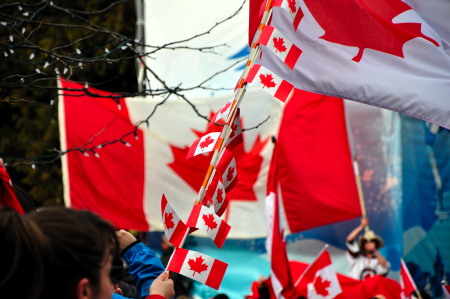
The flag is subjected to dissemination by repetition, with each symbol fracturing according to a renewed distribution of power. photo: tobias c. van Veen
Or, conversely, and in the worst case, Vancouver, Canada, and the contested symbol that is now the Canadian flag may be returned, once again, to state control, where the Federal government shuts down safe injection sites, where the arts are cut 90% (and virtually eliminated altogether), where public celebrations are curtailed, where the Vancouver Police Department calls the shots in determining the collective responsibility of its citizens, where, in short, “No Fun City” expresses the true heart of patriotism.
But this is not only the case for Vancouver. Vancouver the territory becomes the symbolic map for the nation. How will this map be drawn? And who will wield it? What narratives will come to enclose the excess of carnival? And now that the party’s over, what will happen to this euphoria? For from the Olympic high the nation comes crashing down off this two week binge into the dirty squalor of the everyday. From the Olympic euphoric now, the nation slides into its budget speech of devastating cutbacks & reactionary tough talk, from the podium to the throne speech, from the Callaghan to the ongoing carnage in that other “Canadian” city, Kandahar….
=/ transmission out.
Tags: Olympics, patriotism
.tinyUrl for this post: | https://tinyurl.com/ydalb23f .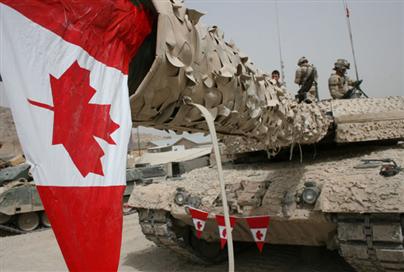
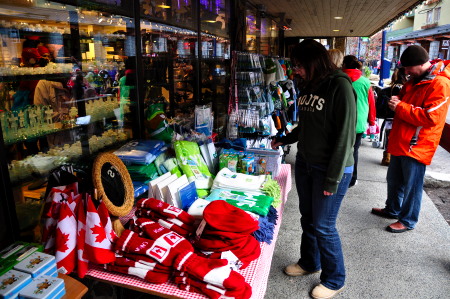
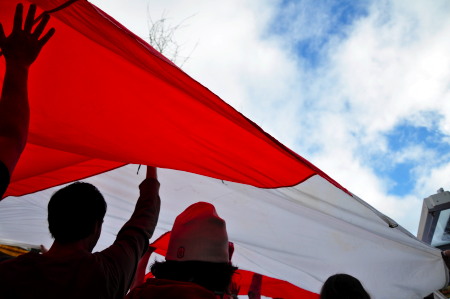
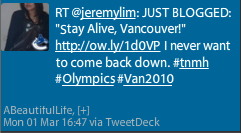





 RT
RT 
Interesting read. This has inspired me to write my own debrief. Thank you.
Let me know when you do so/!
I wish this were a clear and concise commentary, instead of self-convoluting “analysis”.
Here is a random sentence from the post: “Catharsis does not merely return the social order to its balance once the hangover is over, and order restored; its energy is always one of excess, and excess exceeds the composition of the social order”. Has this been written with a lucid intent?
It felt like reading Kant but, needless to say, with much less reward.
Quite lucid, though somewhat ragged, this being a research blog, and not a published tome, must less Kant.
The sentence is logical. Catharsis – the release of emotion which certain of the Greeks believed (including Plato) that theatre produced as a way to ensure the stability of the social order. But I claim (as does Plato; hence his expulsion of certain of the arts from his Republic) that catharsis never returns the public / audience / body to its perfect balance. There is always an excess (this consideration of excess is to be found notably in the work of Bataille). So from the release of catharsis comes an excess (of “energy” let’s say). And this excess exceeds the composition of the social order; in short, this energy cannot be contained within the (old) social order. It has to be incorporated within the social order, but the social order changes because of it: it changes its composition. It de-composes or re-composes, depending on how this energy is re-appropriated.
The balance of the post gets at both negative and positive (to be simplistic) ways of reincorporating excess into the social order. Either it’s change for the good, or change for the bad, to summarize in a simplism that, of course, completely ignores the value-laden terms deployed (“good,” “bad,” etc.).
As usual, the art of reading requires some thinking. On the whole, as a social medium, we’re just not used to that anymore…
Thanks for the explanation, tV.
I stand corrected: I am afraid I am no match to either fully understand (no matter how hard I try to think when I read) or discuss the fine points of the metaphysics of excess, mystic cathartic “energy” (let’s say), or energy contained within social orders, especially as they apply to what happened in Vancouver during the 2010 Olympics.
On a parting note, Plato, writing his Socratic dialogues, used a discursive reasoning, a highly lucid form of polemic, which curiously relates to my original comment.
RT @fugitivephilo: "patriotism & the consumption of carnival" the branding of CDN patriotism http://bit.ly/94XilH #tnmh #van2010
Wowza Tobias. Great work. RT @fugitivephilo: "patriotism & the consumption of carnival" the branding of CDN patriotism http://bit.ly/94XilH
"patriotism & the consumption of carnival" the branding of patriotism http://bit.ly/94XilH #tnmh #van2010 #olympics (via @ fugitivephilo)
RT @fugitivephilo: "patriotism & the consumption of carnival" …analyses the branding of CDN patriotism http://bit.ly/94XilH #tnmh #van2010
RT @fugitivephilo: "patriotism & the consumption of carnival" …analyses the branding of CDN patriotism http://bit.ly/94XilH #tnmh #van2010
patriotism & the consumption of carnival « fugitive philosophy http://bit.ly/a0dH4L
RT @jaypiddy: patriotism & the consumption of carnival « fugitive philosophy http://bit.ly/a0dH4L
Patriotism and the consumption of carnival: @fugitivephilo analyzes the branding of Canadian patriotism http://3.ly/8k5a #report2010 #TNMH
"Patriotism & the consumption of carnival" the branding of patriotism http://bit.ly/94XilH #vo2010